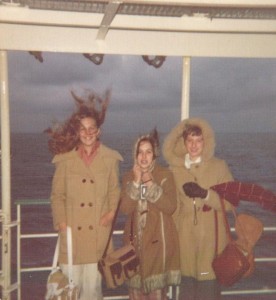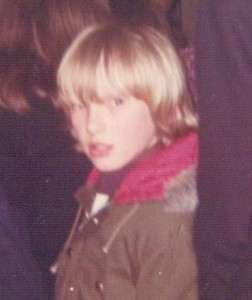After our night at the lycée in Saint-Malo (See European Vacation ’75, Part III), our group was back on the bus early the next morning, heading to Le Havre and the Channel for our crossing to England. I was surprised at the size and relative luxury of the ferry; I guess I had been expecting something bare-bones and rudimentary. I hadn’t imagined that it might house several restaurants, shops and comfortable lounge areas. It was fortunate that it was roomy and fairly pleasant, as the crossing took over six hours. My friends and I wandered freely all over the boat, exploring every level.
When someone discovered a door that led outside, we stumbled upon a real thrill: the open decks. We had never felt such a fierce, strong wind. We were amazed that we could lean into the wind at a sharp angle and remain there, without falling. With the wind behind us, we could jump and be carried as though in flight. Luckily, no one sailed over the railings into the icy waters of the Channel.
After a while, when we began to feel the chill, we noticed two teenage boys hanging around farther down the deck. They were older than we were, probably around sixteen, and they weren’t involved in wind experiments. We could hear their English accents. Evidently this Channel crossing was old hat to them. They soon walked by, ostentatiously ignoring us, trying to appear caught up in their own conversation. When we returned inside, we saw that they remained near the door, still deeply immersed in their dialogue. We began once again to ramble throughout the ship, to see if the boys would follow us. They did. We conspicuously refused to acknowledge their presence, and they did the same to us, despite trailing us at a distance.
After a meandering circuit of the ship, the boys climbed the stairs to the observatory lounge. We remained on the level below. Not long afterwards, several younger English boys appeared. They looked to be about twelve or so. After much heated whispering among themselves, with frequent glances in our direction, they shyly approached. It didn’t take long for them to start firing off questions: How old were we? Where did we live? After each couple of inquiries they would dash upstairs to the observatory, only to return quickly with more questions.
The older boys, apparently, had opted to send in scouts on a reconnaissance mission. Once the younger boys had run through all the questions they could think of, they revealed their purpose. They had been sent to report that there were two “lads” on the upper level who would like to meet us. Due to their accents, we couldn’t at first decipher the word “lads.” Two whats? Lads? Oh, lads! How unbelievably quaint! None of us had ever before been pursued by a “lad!”
Nevertheless, we weren’t interested in the elder lads. They appeared overly serious and lacking in humor. Tall and gangly, they verged on being men. Although we were flattered by the attention, we knew we had no business flirting with men, or almost-men. Looking back, I wonder at their interest in us, several goofy, wind-blown fourteen year olds. Maybe our American-ness gave us some cachet.

The younger lads, though, were an altogether different type: funny, cute, spunky, sweet, smaller than we were, and non-threatening. Their Englishness was simultaneously exotic and reassuring. They reminded me of members of Fagin’s gang of urchins in the Disney movie, Oliver! We never went upstairs to meet the older boys, but spent considerable time chatting with the twelve-year olds. They told us they lived in Staffordshire and were returning from a school “holiday” in Normandy.
I talked primarily with a golden-haired, blue-eyed boy named Graeme Bailey. He gave me his address, which he wrote on a page torn from a small notebook. On the other side was his drawing of a soldier. The address was other-worldly and old-fashioned. It included only one number, and that was a single digit. In looks, in name (and its spelling), and in accent, Graeme was perfectly, enchantingly English. But because he was so open and approachable, before we said goodbye I felt as though I had known him for a long while.
That night, I wrote in my journal that this had been one of the best days of the trip, even though all we did was travel. As I remember, I was feeling rather elated, wide open to life’s possibilities. Before setting foot in Britain, I had met a quintessential English lad, one who took a friendly, cheerful interest in me.
I think I was beginning to grasp the transcendent power of travel. It’s a truly wonderful thing to experience first-hand the vastness and variety of our world’s natural and cultural beauty. This is certainly an adequate reason to roam the globe. But to me, the real power of travel is this: it reveals the depth and strength of the bonds that unite us as a human family. Custom, language, differences in physical appearance–these are simply thin layers of veneer, the candy coating on an M&M. No matter where we were born or where we live, we are more alike than different. This awareness equips us with a powerful force for living with compassion and understanding.


One thought on “European Vacation, ’75: Part IV: Crossing the Channel”
Comments are closed.